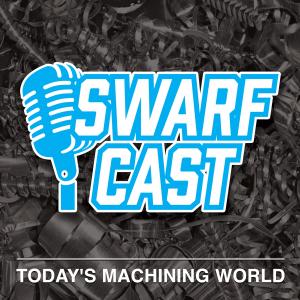Swarfcast

How to Buy and Sell Machines Like a Used Machinery Dealer–EP 217
Do you ever wonder how I make a living buying and selling old iron?
Sometimes Graff-Pinkert’s used machinery business boggles our own minds too. But we have some tricks of the trade that make it possible for me to pay my mortgage, and on today’s podcast I’m going to share a few of them with you.
We’re running an episode from the Job Shop Show podcast, where I was interviewed last year.
Host, Jay Jacobs, and I talked about a lot of fun topics, such as what to watch for when you’re buying used machinery, negotiation tactics, and of course, how to create serendipity.
If you like this interview I recommend you check out the interview I did with Jay in episodes 196 and 197, as well as other episodes on the Job Shop Show.
Listen on your favorite podcast app using pod.link.
View the podcast on our YouTube Channel.
Follow us on Social and never miss an update!
Facebook: https://www.facebook.com/swarfcast
Instagram: https://www.instagram.com/swarfcast/
LinkedIn: https://www.linkedin.com/company/todays-machining-world
Twitter: https://twitter.com/tmwswarfblog
*************
Link to Graff-Pinkert’s ad for Graff-Pinkert’s Acquisitions and Sales promotion!
*************
Interview Highlights
Jay Jacobs: When I used to consider buying used equipment, I must admit I had a lot of fear. Fear of overpaying, fear of buying a lemon, or fear that the machine doesn’t work correctly and I have no one around to help me. As opposed to buying a new machine that’s under warranty.
Noah Graff: First of all, we much prefer selling a used machine to somebody who already has that model or has something very similar. Because unless it’s a Wickman or Davenport, or maybe an ACME multi-spindle, Graff-Pinkert probably is not going to be able to support the machine. If there is something fundamentally wrong with a machine we sell, we will do what’s necessary to make the situation right, even if that means taking a machine back.
As for used machines not working properly, my advice to people is always go and inspect. Spend the $2,000 to go see the machine or hire somebody to inspect the machine for you.
If it’s an older machine, I suggest that you already own that type of machine or that you have someone really experienced to maintain it and operate it.
Also, it’s important to research which machines are going to have the best support from the OEM and which machines have spare parts most readily available. Some models and brands are going to be a lot better than others. Ask around before you spend a bunch of money on a used machine.
Jay: How do you know if you’ve overpaid for a machine? You buy something and the next day you see the same thing and it’s 75% of the price you paid and you feel like a schmuck.
Noah: Well, that’s partly just dealing with yourself. After you buy the machine, you just have to ask yourself, “How much money am I going to make with this machine over the next decade?”
I beat myself up all the time after I finish deals, wondering if I could have paid a few thousand dollars less or made a few thousand dollars more. But that’s counterproductive. That’s just ego.
What you should be thinking about is if this is a good deal that will make you money longterm.
Jay: How do I know that I got the right price? That I’m getting a fair price.
Noah: You and I have both read the negotiation book, Never Split the Difference. So I know we both hate the word “fair.” Everyone has a different opinion of what “fair” means.
But, as far as getting a “good price.” Do some research. Call a bunch of dealers and get quotes on similar machines and then compare them.
Also, always ask around about the people you’re buying the machines from if you’re not familiar with them.
We’ve been cheated out of a lot of money on past deals, and it likely would have been prevented if we had just asked some other dealers about the seller, or even just googled the seller.
There was a deal in Japan a few years back in which we thought we were being clever by not telling other people about our great source of cheap machines. Then we lost a few hundred thousand dollars on machines that never came. When we finally asked some other dealers about the seller, a Taiwanese dealer called JS Precision, we found out that they were notorious and the owner had gone to jail.
Do research. It’s one of the most important parts of buying machinery, whether it’s new or used.
People often ask me, which brand of machine they should buy? And I say that most of them are pretty good. Some things are personal preference. This brand has one feature. This brand has another feature.
But I usually advise people to find out which machines the most shops around them have. That’s important if you later need help or resources. Also, ask other shops which brands have the best service in your area. If you check those things, you’re probably going to be OK with your purchase, at least for a while.
Questions: What’s one of the greatest deals you’ve ever made?
What’s one of the worst deals you’ve made?
The post How to Buy and Sell Machines Like a Used Machinery Dealer–EP 217 first appeared on Today’s Machining World.







 Visit Podcast Website
Visit Podcast Website RSS Podcast Feed
RSS Podcast Feed Subscribe
Subscribe
 Add to MyCast
Add to MyCast